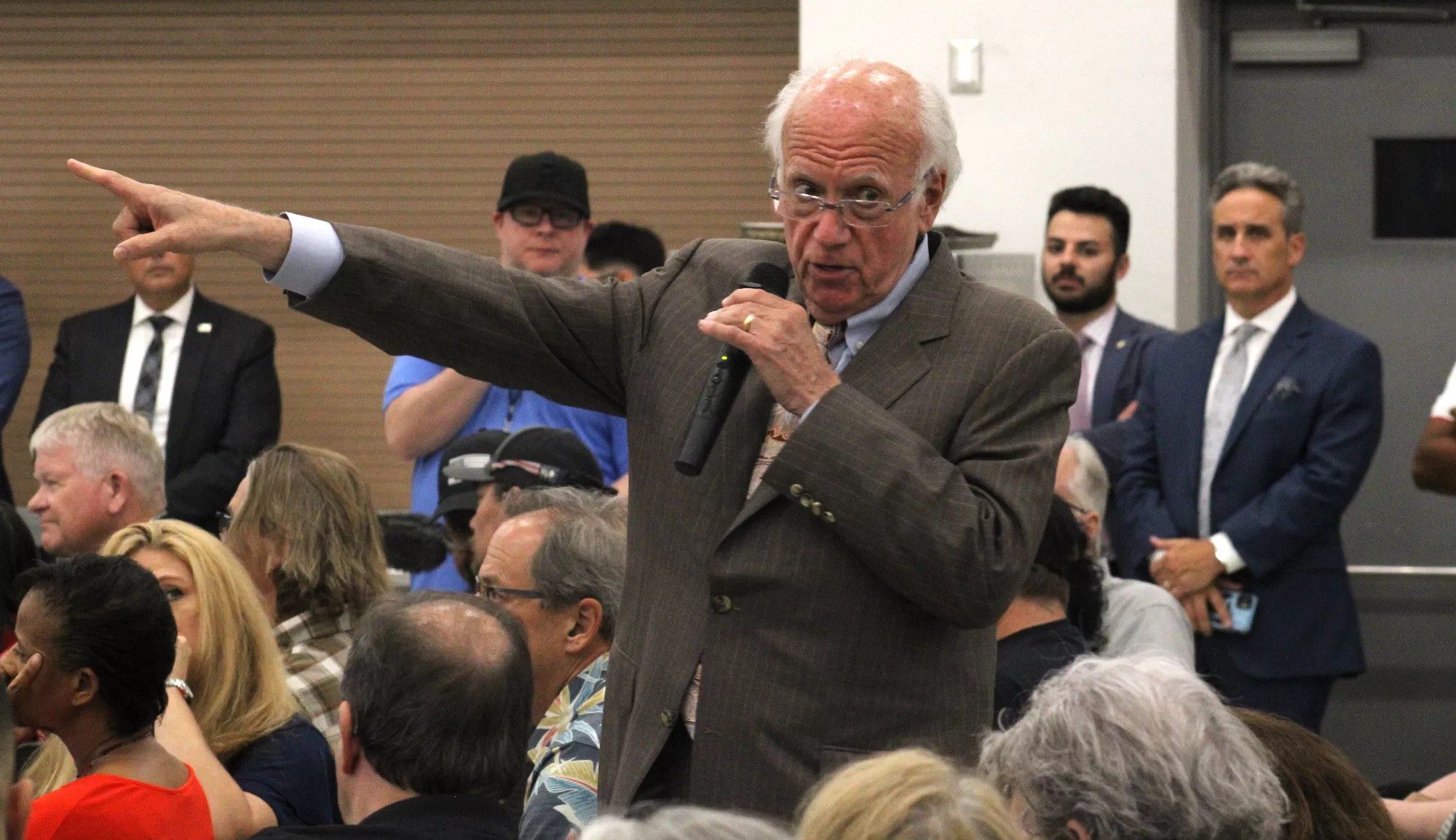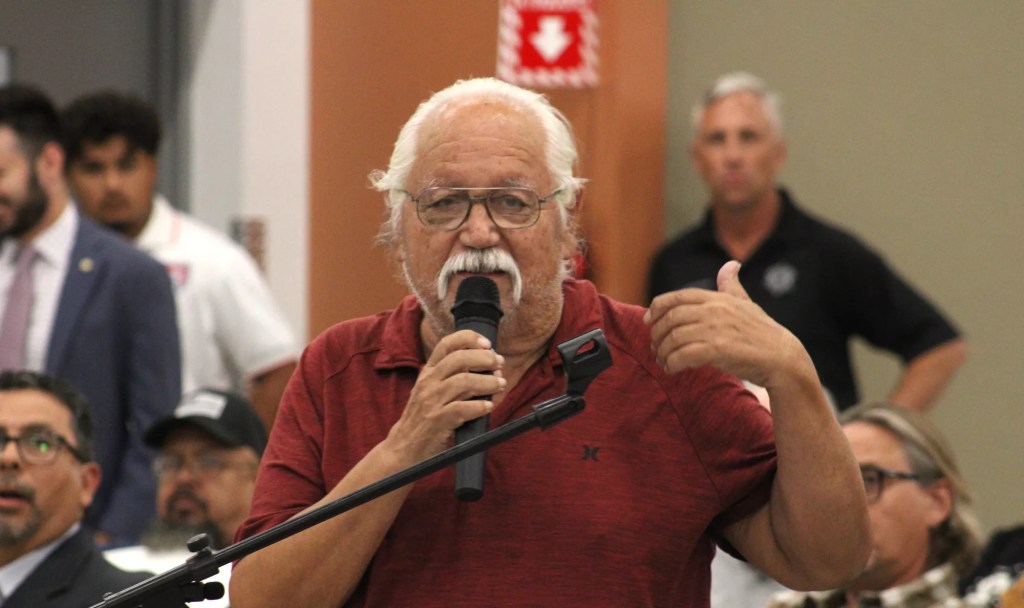
Morgan Fischer

Audio By Carbonatix
For a decade, the Maricopa County Sheriff’s Office has participated in quarterly court-ordered community meetings to discuss its history of racist policing and its progress toward making reforms. But now, after recent meetings became heated and raucous, U.S. District Court Judge G. Murray Snow is switching up the script.
Beginning at the next meeting in October, all attendees will have to navigate through metal detectors and an ID check before attending the meeting in the Special Proceedings Courtroom on the second floor of the Sandra Day O’Connor U.S. Courthouse in downtown Phoenix. Snow will preside over the meetings, which previously operated as a relatively loose free-for-all.
Snow mandated the meetings as part of the federal civil rights case Melendres v. Arpaio, in which Snow found that former Maricopa County Sheriff Joe Arpaio engaged in unconstitutional policing of the county’s Latino community. Generally, the meetings are largely attended by Latino community members who share their concerns about how the sheriff’s office conducts itself.
But at July’s meeting, the tone and the crowd were different. Republicans — including Thomas Galvin, the chair of the Maricopa County Board of Supervisors, and fellow supervisor Debbie Lesko — showed up in droves, angered by the roughly $350 million the county soon to projects to have spent on compliance efforts since monitoring began. (Snow wants to appoint someone to audit that accounting.) Galvin and Lesko have called to rein in or even end the federal oversight due to cost.
Galvin declined to comment to Phoenix New Times, while Lesko did not respond to a request.
At that meeting, some members of the pro-sheriff crowd clashed with some of the usual meeting attendees. Harsh words were exchanged, physical altercations nearly broke out and tempers flared. In a mid-September court hearing, Snow revealed he had almost attended the July meeting but was told not to after Robert Warshaw, the monitor Snow appointed to oversee reforms at the sheriff’s office, warned that people were there with sidearms.
“I’m concerned,” Snow said at the same court hearing. “I am trying to have them in a safe place where there’s going to be control and where we can move this ball forward.”
At that hearing, Snow proposed that the meeting take place in the federal courthouse, a move that was generally supported by members of the Community Advisory Board, which acts as a liaison between the community and the sheriff’s office. In a Sept. 26 ruling, Snow made it official. The Oct. 22 meeting will be held at the courthouse.

Morgan Fischer
New format
The format will also change. Previously, individual community members would go to a microphone and speak directly to the sheriff and the monitor about their concerns and ask questions. But after non-Melendres questions, mainly focused on cost, dominated the previous meeting, Snow implemented a new system to keep questions focused on the meeting’s purpose.
Going forward, the advisory board will meet with residents before the meeting to gather questions for the sheriff and Warshaw. While longtime immigration and community advocate Sal Reza said he hopes “people will still be able to express themselves,” it’s unclear if traditional public comment will be held. Snow’s order stated that “further direction and advertising concerning the meeting shall come from the Monitor upon consultation with the Community Advisory Board.”
Members of the advisory board seem supportive of the change, given the chaos of the last meeting. Raul Piña, who was appointed to the board by the ACLU in 2016, said the order was “necessary because of safety concerns.” Michael Nowakowski, who was appointed to the board by the sheriff’s office in April, said the previous meeting was a big, uncoordinated mess at which “everybody was just talking out of line.”
“All this other stuff about how much the monitor is getting paid and all that, that’s a concern,” said Nowakowski, who ran unsuccessfully for the Phoenix City Council in 2024. “But the number one concern is the victims, the individuals who are still getting discriminated against. Those are the ones I want to hear from.”
The board is already getting to work. It’s set to meet on Wednesday to discuss how to collect questions and comments from the community and then synthesize them into a usable format for the Oct. 22 meeting.
Piña recognized that the change in venue could “leave some people’s voices out of the meeting” and is concerned that “we’ll have minimal participation.” Latino community members, undocumented or otherwise, may not want to risk an encounter with Immigration and Customs Enforcement, which is openly racially profiling people as it strains to meet detention quotas. Some community members may be hesitant or unwilling to go to a federal building. Piña is hopeful that organizations, representative groups and communities will go in their place to represent community interests.
Not everyone is on board. Both Albert Rivera, a staple of the meeting and a vocal opponent of the sheriff’s office, and local Republican leader Lisa Everett weren’t happy about the news. They both attended the July meeting.
Rivera was “outraged” over Judge Snow’s decision and called it a “huge slap in the face,” criticizing Galvin and Lesko for turning the meeting “into a political rally” that “ruined everybody’s opportunity to express their First Amendment rights.” Everett, who is the Republican Party chair for Legislative District 29, criticized Snow for wanting to “silence views that are different than his,” adding that “if I were wasting taxpayer dollars, I wouldn’t want someone to talk about the cost either.”
Despite the change, Rivera still plans to attend the meeting in some way and potentially organize a demonstration ahead of time. Everett will also attend and plans to advertise the meeting in her newsletter, which goes out to thousands of Republicans across the Valley. She also said she plans to make t-shirts or encourage attendees to place tape over their mouths “like we can’t talk.”